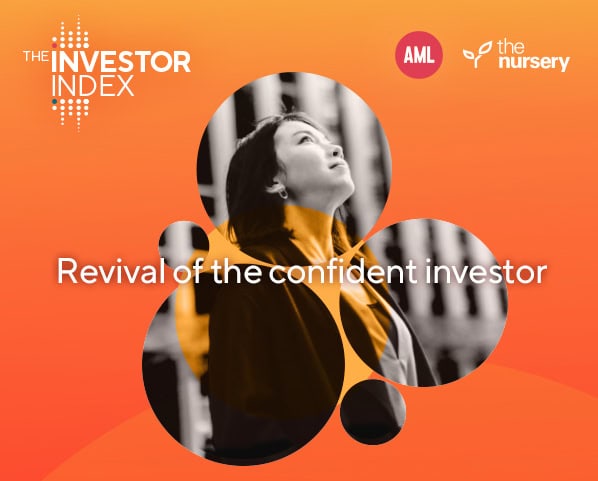UK investor confidence has taken a big hit – a drop of 38% according to the Investor Index, a recent study we conducted with Nursery Research. And it points to growing evidence that we humans are irrational beings when it comes to investment and trust. It’s also thrown up a few surprises.
First, despite growing talk at the top of the year of looming market corrections, economic shutdown in China and a general sense of uncertainty, those arguably most threatened short term by big market falls – older people, near or in retirement – were the most confident pre-pandemic.
And second, investors’ focus when the crisis hit distorted their views of and away from ethical investing – gravitating towards flexible, low risk, short-term growth.
Arguably, self-interest and protecting those near and dear had overridden a wider sense that ethical investing is a good thing for the future. And there is a clear perception that ethical investing carries a performance penalty. Which, ironically, of course proved not to be the case in the initial Covid19 market collapse.
But we perhaps shouldn’t be surprised by these examples of proximity and confirmation biases. Our study’s findings chime with a 2015 Natixis global survey of c2400 advisers, which ranked ‘emotional decision making’ as the worst mistake investors make, followed in 2nd place by ‘having a short-term volatility focus’.
System 1 and 2 thinking:
It all comes down to brain morphology. Some call it system 1 and 2 thinking, others the difference between our ‘animal’ limbic and homo sapiens neo-cortex brains. But the point’s the same; humans are proven to be emotional or sentimental beings first and rational thinkers second.
It follows that markets are irrational, too. For all the considered talk of fundamentals, market swings are triggered by individuals’ collective sentiment. When Crispin Odey suggested on February 28th, with the FTSE 100 already down markedly at 6,500, that it may tumble to near 5,000, he was assessing the likely mass sentiment of investors who had supported companies ‘already guilty of taking too many risks … not reflected in their share prices’, (Mohamed El-Erian, chief economic adviser, Allianz). And in our Investor Index study, one investor had seen opportunity in Wetherspoon’s sentiment-driven share price collapse following CEO Tim Martin’s widely derided comments about the lockdown. Judging that rational reassessment would see it rebound, sure enough, nine days after he bought 25000 shares @ £5.75, he sold them at £9.90.
As I write this, the S&P 500 has recently recovered from its Covid-19 collapse to a record high, whilst in the UK the FTSE edges ever nearer to recovery. All in spite of predictions of mass unemployment, business failures and a collapse in property values.
Adviser, friend, life coach…
Arguably, then, for the investor, there should be a cool, hard, dispassionate head in between these unaligned, tsunami-like waves of investor and market sentiment. A sharp adviser brain that ensures rational decisions to optimise the likelihood of long-term growth, capital protection or regular income needs. That’s what investment advisers do, right? They make recommendations based on facts. Pure and simple.
But our study shows something else. Advisers are indeed seen, and valued, as investment experts that clients run screaming towards, away from the fear and uncertainty of markets in freefall. This trust in experts, on those that rely on evidence and have no ulterior agenda, is a form of relational trust: how we feel about our relationships, real or imagined, with people, brands and institutions.
But advisers are increasingly valued for a lot more than cold expertise. In this pandemic, they proactively reached out to clients ahead of the crash. Building on their experience of the 2008 crisis, advisers have seen clients’ appreciation of their softer skills – more akin to those of a close friend or even life coach. They reassure, they talk about clients’ achievements, concerns, family issues and how they’re feeling – as well as their investment goals and how best to achieve them. Significantly, in this crisis, investors have not just felt pushed in the direction of their advisers, but pulled towards them, too.
Again, our study is no outlier. Portfoliometrix’s June 2020 “The insiders’ guide to the value of advice”, found that soft skills scored the highest of all attributes advisers see as key to their roles. Empathy was the standout winner – with 76% including it in their top five.
Perhaps the clue to that is in a longer-term trend, that of growing ‘distributed’, or ‘horizontal’ trust where declining confidence in government, in business and institutions is substituted by trust in – and reliance on – “a person like yourself” (Edelman).
Whatever the reason, our study along with others underpins a belief many of us have held since the early days of online advice. However intuitive, interactive, seamless, brief or pleasing the experience, purely digitally-served advice is unlikely ever to usurp entirely the human interaction that appeals to our primary, sentiment-driven receptors. It seems that advisers’ perceived increased worth will see clients continuing to call on them long after the current crisis has passed.
By Christian Barnes.
Originally appeared in What Investment Magazine.


